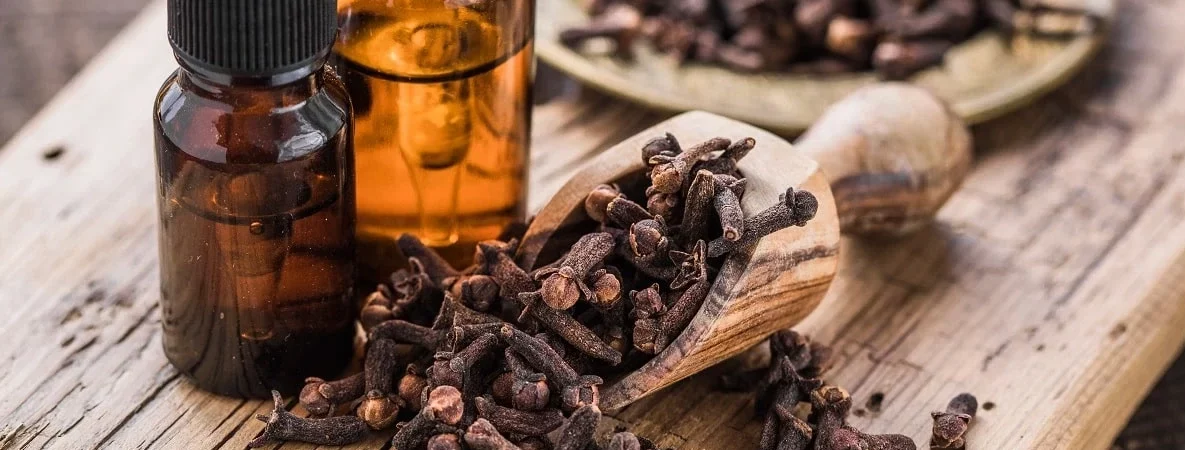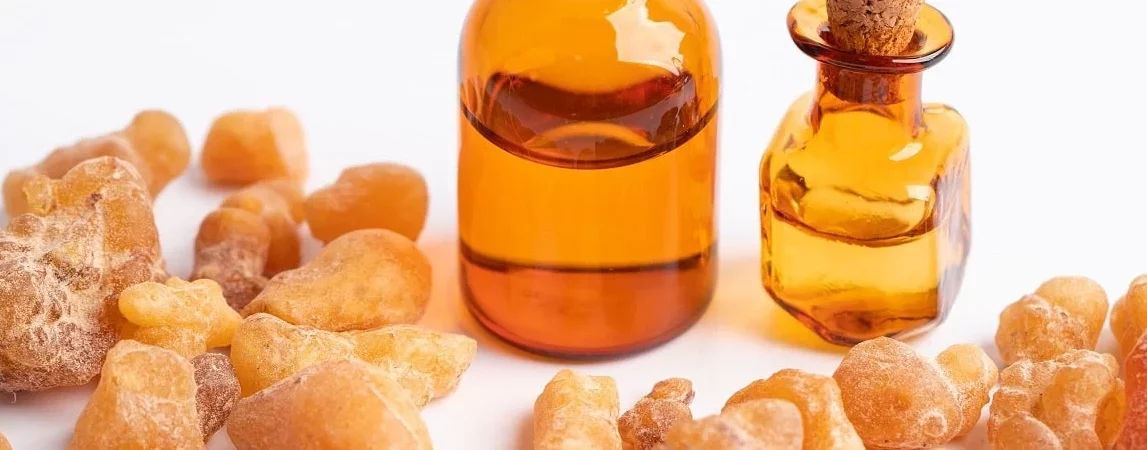Last Updated on: 29th December 2025, 09:09 am
Essential oils for toothache are substances that are extracted from various parts of plants, such as the root, leaves, bark, stem, and flowers. For several years – since ancient Egyptian culture, it could be said – essential oils have been used as a home remedy for various ailments, such as muscle discomfort, headaches, knee pain, and some dental conditions, among others.
Here we share which essential oils offer the greatest benefit for relieving toothache (odontalgia).
Causes of Toothache
Regularly, toothaches are the result of dental cavities, nerve irritation, inflammation of the tooth pulp, or gum disease.
Dental caries create a hole in the tooth and expose the nerve. When in contact with hot or cold foods/beverages, pain occurs. If left untreated, the cavity progresses, affecting the tooth pulp and subsequently leading to an abscess, which involves inflammation, pus, and continuous pain.
Toothache often originates from one of the following conditions:
• Periapical abscesses
• Bruxism
• Cavities
• Pulpitis
• Trauma and fissures
• Wisdom teeth pressing the gum tissue also known as pericoronitis.
What Essential Oils for Toothache can be Used?
Around 100 essential oils are known, each with its respective effects for managing odontalgia. Here are some of the recommended essential oils for managing toothache:
1. Basil oil
In traditional natural medicine, it is used as an anti-inflammatory to soothe discomfort related to problems in the gums or teeth. A piece of cotton is moistened with the oil and gently rubbed on the affected areas. The procedure is recommended three times a day.
2. Cinnamon oil
It has analgesic, antiviral, and antibiotic properties that help reduce bacteria in the mouth, inflammation, and other uncomfortable symptoms related to toothache. A couple of drops of oil are taken and applied to the affected area several times a day.
3. Clove oil
Clove oil has a high content of eugenol, a substance with analgesic, antibacterial, and anti-inflammatory properties. When applied topically, it is very helpful in controlling toothache and gum pain. It is also effective in reducing the bacteria that cause cavities.
A 2012 study found that this oil can reduce the loss of calcium, which erodes enamel and causes cavities. It has remineralizing effects that strengthen tooth enamel and protect teeth from discomfort caused by heat, cold, or sweet.
This oil can be rubbed directly on the affected tooth. Another option is to moisten a cotton swab with the oil and apply it for 10 minutes in the painful area, several times a day.
4. Frankincense oil
It is also known as olibanum and has analgesic and anti-inflammatory properties. When used in an oral preparation, it has antibacterial properties that help combat cavities and gum disease.
Frankincense oil can be rubbed directly on the affected tooth. If applying pure oil is uncomfortable, it can be mixed with olive oil or distilled water (5 drops of frankincense with a teaspoon of olive oil). The mixture is then soaked in a cotton ball and applied to the affected area for 10 minutes, several times a day.
5. Lavender oil
This essential oil for toothache contains linalool, a component with antibacterial and antifungal properties that help reduce plaque on teeth and combat cavities. To control toothache, the oil is placed in an aroma diffuser and inhaled. You can also light a lavender candle and inhale the aroma. Another option is to drink lavender tea, which allows you to receive the benefits of its antibacterial and anti-inflammatory properties.
6. Chamomile oil
It contains antibiotic and analgesic compounds that help reduce inflammation, pain, and bacteria that cause bad breath. To manage toothache, two drops of oil are placed on a cotton swab and rubbed on the affected areas.
7. Peppermint oil
The main component of this peppermint oil is menthol, an analgesic that has a counterirritant effect on the skin and helps control the sensation of pain. It also helps reduce plaque on teeth. Wetting a peppermint tea bag with water and applying it to the affected area provides relief and reduces pain.
8. Thyme oil
It has antioxidant and antiseptic properties that counteract the effects of bacteria. It is recommended for reducing inflammation and gum health. To manage toothache, mix five drops of oil in half a glass of warm water and gargle several times a day. Using it as a mouthwash complements the effect of dental brushing.
What Precautions Should be Taken When Using Essential Oils for Toothache?
• In some cases, essential oils can cause allergic reactions. It is recommended to do an initial test on a leg or arm to see if there is any rejection effect.
• Do not buy pre-diluted oils. Only buy pure oils.
• Keep in mind that essential oils are not regulated by the FDA, which is why it is recommended to buy oils from a known, trustworthy brand.
• If applying oil on skin or mucous membranes, always use diluted oil, except if the product instructions provide a different indication.
• Only ingest oils that come in presentation for oral consumption (capsules or infusion bags).
Always keep in mind that using essential oils for toothache is a palliative resource and does not replace the required treatment for the condition that is causing the discomfort. Consulting a dentist will be the appropriate route.
Frequently Asked Questions
What essential oil can you use for tooth pain?
Clove oil contains eugenol, a compound that functions as an anesthetic and antibacterial agent. It can be an effective remedy for toothaches or tooth pain. Eugenol, found in cloves, has been utilized in dental care since the 19th century.
What is the best oil for alleviating a toothache?
Oil Pulling: It is recommended to use coconut oil for oil pulling due to its antimicrobial and anti-inflammatory properties. For optimal results, swish with coconut oil first thing in the morning before consuming any food or drinks.
How do you prepare toothache oil?
The oil should never be applied directly to the gums without dilution. To use clove oil for a toothache: Mix 3 to 5 drops of clove oil with 1 teaspoon of an edible neutral carrier oil such as olive oil, canola oil, grapeseed oil, or sweet almond oil. Dip a cotton ball into the diluted oil and apply it to the affected gums, avoiding the tooth.
What essential oils can help with nerve pain in teeth?
Several essential oils, such as clove, nutmeg, eucalyptus, and peppermint oil, have pain-relieving properties. To use, dilute one of these oils and apply it to the affected tooth or gum area using a cotton swab. Repeat as necessary. Apple cider vinegar can also be used in a similar manner.
Share:
References
1. Asian Pac J Trop Biomed (Febrero de 2014) Clove (Syzygium aromaticum): a precious spice / https://www.ncbi.nlm.nih.gov/pmc/articles/PMC3819475/#:~:text=Concentrations%20up%20to%2018%25%20of,2.1%25%20is%20%CE%B1%2Dhumulen.
2. DeLucca Afton (Mayo 19 de 2021) Best Essential Oils for Toothache Pain / https://www.healthline.com/health/dental-and-oral-health/essential-oils-for-toothache
3. Hennessy Bernard (2023) Dolor de muelas / https://www.msdmanuals.com/es/hogar/trastornos-bucales-y-dentales/s%C3%ADntomas-de-los-trastornos-orales-y-dentales/dolor-de-muelas
4. Sang-Eun Moon, Hye-Young Kim, Jeong-Dan Cha (Septiembre de 2011) Synergistic effect between clove oil and its major compounds and antibiotics against oral bacteria / https://www.sciencedirect.com/science/article/abs/pii/S0003996911000513
-
Nayibe Cubillos M. [Author]
Pharmaceutical Chemestry |Pharmaceutical Process Management | Pharmaceutical Care | Pharmaceutical Services Audit | Pharmaceutical Services Process Consulting | Content Project Manager | SEO Knowledge | Content Writer | Leadership | Scrum Master
View all posts
A healthcare writer with a solid background in pharmaceutical chemistry and a thorough understanding of Colombian regulatory processes and comprehensive sector management, she has significant experience coordinating and leading multidisciplina...
























